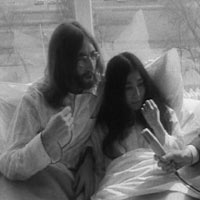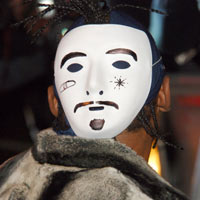- by Gavin Duffy
- Wednesday, May 30, 2007
Some people have said the art of conversation is dead; I am not one of these people. The art of conversation is alive and well, living a healthy life. The brisk exchange of ideas and thoughts on a shared interest is still a huge part of life. Problems though begin to appear once you throw phones, a translator and two languages into the mix. These factors can leave the art of conversation, bloodied and bruised and in need of some medical attention. The opportunity to open a spontaneous dialogue and seizing upon quotes for elaboration is restricted when filtering your questions through a third party.
Gigwise faced these odds but the kicker is, any opportunity to talk to a musician as unique and innovative as Cornelius should be grabbed, no matter what obstacles are put in front of you. Questions can be lost in translation, long pauses between questions, some answers may be short but an insight into the working of a true visionary is reward enough.
To completely understand the mechanics and sheer breath of multi-instrumentalist Cornelius’ work you would probably require a team of egg headed super crazy scientists working around the clock merely to gather the cultural and sonic references in his five albums. This is also ignoring his elephantine remixing work, his jaw dropping live shows, his audiovisual piece exhibited at the Barbican, designing a game for the Gameboy Advance and the ability to leap tall buildings in a single bound (this may not be true).
Cornelius is mainly Keigo Oyamada to his friends; Cornelius, more so than being a solo Keigo Oyamada incarnation, represents something broader, “Its not that I am actually separating my name, Keigo Oyamada and Cornelius on purpose but basically when I use the name Cornelius I refer to everybody that is involved in the whole project”. The name Cornelius, Roddy McDowell’s smart ape in The Planet Of The Apes, came more from a popular form of meditation than inspiration, “It just happened to be that when I was trying to come up with the band name, I went home and turned the TV on and The Planet of the Apes was on”.
Oyamada first gained awareness in Japan as part of Tokyo-based popsters, Flipper’s Guitar, a band influenced by The Beatles and The Beach Boys more poppy diversions. The band were leading lights in the birth of the influential Shibuya-kei music style in Tokyo. Flipper’s Guitar broke up in 1991 and Oyamada took time off from being a musician, concentrating on other projects, biding his time. Until in 1993, he was back, materialising under the Cornelius moniker. Cornelius released two moderately successful albums in Japan, ‘First Question Award’ (1994) and ‘69/96’ (1995) before literally exploding with 1997’s ‘Fantasma’, securing him a US release with the highly regarded indie label Matador.
‘Fantasma’ allowed Oyamada to branch out from Tokyo and reach the worldwide audience his music craved to find. But he never courted fame or commerciality, “If commercial success means to become famous, that is not what I am trying to”. A desire for his music to be heard was his only.phpiration, “I would like to have my music heard by many people. Basically I make my music for people. I like making music”.
The album was the beginning of the breakthrough of Cornelius’ to a western audience; he had fully found his voice and the multitude of ideas and references spinning around his head were coming out. On all his albums his influences can be far-reaching and close by including becoming a father just before his next album, ‘Point’ (2002), was released, “The daily things around me have also affected me and one of those big things was having a child”. ‘Point’ was without doubt a masterpiece, an album with textures you may never hear until years later of intensive listening, combining layer upon layer of different sounds compiled from the four corners of the Earth. It was a pioneering album in electronica. The detail is just staggering, a lesson in streamlined abstraction.

 50 Music Anniversaries In 2009
50 Music Anniversaries In 2009  The Worst Teeth In Music - Part Two
The Worst Teeth In Music - Part Two Coolio, La Toya Jackson Enter Celebrity Big Brother House
Coolio, La Toya Jackson Enter Celebrity Big Brother House
Register now and have your comments approved automatically!